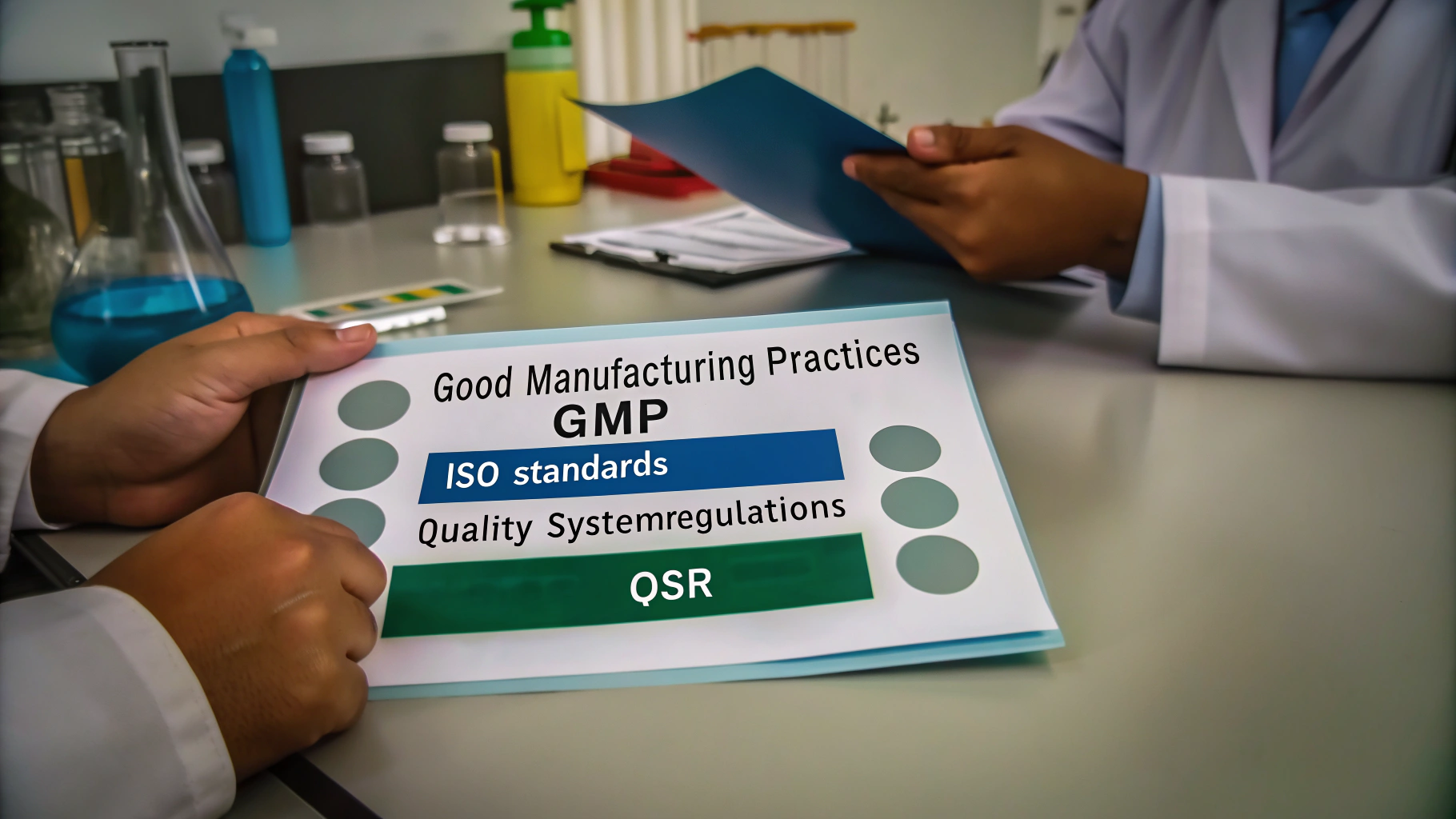Best Practices for Data Integrity in Pharmaceutical Industry Compliance

Overview
Best practices for data integrity in the pharmaceutical industry center on maintaining accuracy, consistency, and reliability of information. This is crucial not only for meeting compliance requirements but also for ensuring stakeholder confidence. Adhering to principles such as ALCOA+ is vital in navigating compliance challenges.
Furthermore, implementing regular training and establishing clear documentation practices are essential strategies. Technological solutions also play a significant role in safeguarding data integrity throughout the drug development lifecycle. By embracing these practices, organizations can enhance their compliance efforts and build trust among stakeholders.
Introduction
In an industry where the stakes are incredibly high, the integrity of data can mean the difference between patient safety and catastrophic failure. As pharmaceutical companies navigate increasingly stringent regulatory landscapes, the emphasis on data accuracy, consistency, and reliability has never been more critical. This article delves into best practices for ensuring data integrity, exploring the core principles that underpin compliance and the tangible benefits organizations can reap from robust information management systems. However, as the landscape evolves, what challenges lie ahead for companies striving to uphold these standards in a rapidly changing environment?
Define Data Integrity in Pharmaceuticals
The accuracy, consistency, and reliability of information in the pharmaceutical sector, which is crucial for ensuring data integrity in the pharmaceutical industry, define its quality throughout its lifecycle, encompassing all phases from research and development to production and post-market monitoring. In 2025, the significance of information reliability is more evident than ever, as governing organizations increasingly emphasize its importance in adherence. For instance, the FDA's focus on 21 CFR Part 11 underscores the necessity of robust information management systems that transcend mere technical compliance.
Ensuring data integrity in the pharmaceutical industry is critical, not only for meeting compliance obligations but also for maintaining the confidence of stakeholders, such as oversight bodies, healthcare professionals, and patients. AVS Life Sciences offers comprehensive quality management and compliance solutions, such as GXP Training and Compliance Audits, which ensure that information consistency is upheld throughout the drug development lifecycle. Their expertise in GXP regulatory services guarantees that systems, processes, and teams remain compliant with evolving regulations and the highest industry standards.
A thorough framework for ensuring data integrity in the pharmaceutical industry, supported by AVS Life Sciences, guarantees that content is complete, precise, and securely maintained, effectively preventing unauthorized access or alterations that could compromise its validity.
Practical examples highlight the critical nature of information accuracy in adherence. The Cencora information breach, which resulted in the largest recorded cyber extortion payment, illustrates the severe consequences of failures in information quality, including extensive leaks of personal health data. Furthermore, organizations that have implemented effective information reliability programs report enhanced compliance outcomes, as evidenced by case studies demonstrating adherence in clinical trials, where expertise and diligence are paramount for ensuring credible results.
Expert opinions reinforce the necessity of data integrity in the pharmaceutical industry. As noted by industry specialists, data integrity in the pharmaceutical industry instills confidence in the quality, efficacy, and safety of medications. By adhering to established information reliability principles, including the ALCOA+ principles (Attributable, Legible, Contemporaneous, Original, Accurate, Complete, Consistent, Enduring, and Available), pharmaceutical companies can ensure data integrity in the pharmaceutical industry and bolster their reputation and credibility within a highly regulated environment.

Explore the Core Principles of Data Integrity
The core principles of data integrity are encapsulated in the acronym ALCOA+, which stands for Attributable, Legible, Contemporaneous, Original, and Accurate. Each principle is essential for maintaining trustworthy data in the pharmaceutical sector:
- Attributable: Data must be traceable to the individual who generated it, ensuring accountability and transparency in data management. This principle is crucial as organizations face scrutiny from regulators; many pharmaceutical companies have reported unexpected reprimands due to lapses in data integrity in the pharmaceutical industry.
- Legible: Data should be easily readable and understandable to prevent misinterpretation. Transparent documentation methods, including compliance with Standard Operating Procedures (SOPs), are vital, as legibility directly affects the capacity to review and audit information effectively.
- Contemporaneous: Data must be recorded at the time of the activity, ensuring that it accurately reflects the process. This practice not only aids in adherence to regulations but also enhances the trustworthiness of information during inspections, particularly in the context of computer system validation procedures.
- Original: Original records must be preserved, with any copies clearly marked. Maintaining data integrity in the pharmaceutical industry is essential for regulatory compliance, as it enables precise reconstruction of events—a key aspect of the validation process detailed in the Good Automated Manufacturing Practices (GAMP) 5 Guide.
- Accurate: Data must be correct and free from errors, reflecting the true situation. Implementing robust validation processes, such as Installation Qualification (IQ), Operational Qualification (OQ), and Performance Qualification (PQ) testing, along with independent information review methods, can significantly enhance accuracy.
- Complete – All data must be included, with nothing omitted.
- Consistent – Data should follow a logical order and format.
- Enduring – Data must be preserved over time.
- Available – Data should be accessible when needed.
Understand Regulatory Standards and Compliance Requirements
Regulatory standards are crucial for ensuring data integrity in the pharmaceutical industry, guided by several key frameworks that shape compliance efforts.
- Good Manufacturing Practices (GMP) dictate that products are consistently produced and controlled according to established quality standards. The accuracy of information is a pivotal element of GMP adherence, ensuring that all data generated during manufacturing processes supports data integrity in the pharmaceutical industry by being precise, dependable, and traceable.
- ISO Standards, particularly ISO 9001, emphasize the significance of quality management systems, which include robust information reliability protocols. Implementing these standards enables organizations to uphold high-quality information management practices, thereby enhancing overall compliance.
- Quality System Regulations (QSR) require producers to develop and maintain a comprehensive quality system that incorporates information reliability as a core component. Compliance with QSR ensures that information management practices align with regulations, which is essential for maintaining data integrity in the pharmaceutical industry while enhancing product quality and safety.
As organizations approach 2025, they must remain vigilant regarding evolving GMP adherence requirements for accuracy, as oversight bodies continuously refine their expectations. The integration of ISO standards into quality management systems has proven beneficial for bolstering information reliability adherence across the life sciences sector. Recent statistics indicate that a significant proportion of pharmaceutical firms are actively pursuing ISO compliance, reflecting a growing recognition of the importance of information reliability within compliance frameworks.
By aligning information management practices with these regulatory standards, organizations can mitigate the risk of non-compliance and evade potential regulatory scrutiny, ultimately safeguarding the safety and efficacy of their products.

Implement Best Practices for Data Integrity Management
To effectively manage data integrity in the pharmaceutical industry, organizations must adopt best practices that address compliance challenges and drive engagement with AVS Life Sciences solutions.
- Conduct Regular Training: Educating all employees on information integrity principles and the significance of compliance is essential. Regular refresher courses not only maintain awareness but also reinforce the importance of governance policies.
- Establish Clear Documentation Practices: Creating standard operating procedures (SOPs) for information entry, storage, and retrieval ensures consistency and accuracy. This aligns with the ALCOA framework, which emphasizes that information must be attributable, legible, contemporaneous, original, and accurate.
- Employ Technological Solutions: Implementing electronic systems that support information accuracy—such as validated electronic lab notebooks (ELNs) and laboratory information management systems (LIMS)—enhances handling processes. Modern technologies like electronic signatures and audit trails further bolster information integrity.
- Conduct Routine Audits: Regular evaluations of information management practices are crucial for identifying potential weaknesses and areas for enhancement. This proactive approach mitigates risks before they escalate, ensuring adherence to Good Manufacturing Practices (GMP) and Quality System Regulations (QSR).
- Nurture a Culture of Excellence: Fostering a company-wide commitment to quality and information reliability empowers employees to understand their roles in upholding standards and addressing concerns. As industry experts highlight, information is a valuable resource that fuels informed decision-making and innovation.
By implementing these best practices, organizations can significantly enhance data integrity in the pharmaceutical industry and ensure compliance with regulatory standards, ultimately leading to improved outcomes.

Conclusion
Ensuring data integrity in the pharmaceutical industry is paramount for maintaining compliance and fostering trust among stakeholders. This article highlights the critical nature of accurate, consistent, and reliable data throughout the drug development lifecycle. Adherence to established principles and regulatory standards is essential for safeguarding the quality and efficacy of medications.
Key arguments presented emphasize the importance of the ALCOA+ principles—Attributable, Legible, Contemporaneous, Original, and Accurate—as foundational to maintaining trustworthy data. Moreover, the role of regulatory frameworks such as Good Manufacturing Practices (GMP) and ISO standards in shaping compliance efforts cannot be overstated. By adopting best practices, including:
- Regular training
- Clear documentation
- Technological solutions
organizations can enhance their data integrity management strategies and effectively mitigate compliance risks.
The significance of data integrity extends beyond mere compliance; it is a vital component of patient safety and product reliability. As the pharmaceutical landscape continues to evolve, organizations are urged to prioritize data integrity as a cornerstone of their operational practices. By fostering a culture of accountability and transparency, companies can navigate regulatory complexities, ultimately ensuring that they uphold the highest standards in the industry. Embracing these best practices not only enhances compliance but also reinforces the commitment to delivering safe and effective healthcare solutions.
Frequently Asked Questions
What is data integrity in the pharmaceutical industry?
Data integrity in the pharmaceutical industry refers to the accuracy, consistency, and reliability of information throughout its lifecycle, from research and development to production and post-market monitoring.
Why is data integrity important in pharmaceuticals?
Data integrity is crucial for meeting compliance obligations and maintaining the confidence of stakeholders, including regulatory bodies, healthcare professionals, and patients.
What are the regulatory requirements related to data integrity?
Regulatory requirements, such as the FDA's 21 CFR Part 11, emphasize the need for robust information management systems that go beyond technical compliance to ensure data integrity.
How does AVS Life Sciences support data integrity?
AVS Life Sciences provides quality management and compliance solutions, including GXP Training and Compliance Audits, to ensure information consistency throughout the drug development lifecycle and compliance with evolving regulations.
What framework is necessary for ensuring data integrity?
A thorough framework must guarantee that data is complete, precise, and securely maintained, preventing unauthorized access or alterations that could compromise its validity.
Can you provide an example of the consequences of data integrity failures?
The Cencora information breach, which resulted in the largest recorded cyber extortion payment, exemplifies the severe consequences of failures in information quality, including extensive leaks of personal health data.
What benefits do organizations gain from effective information reliability programs?
Organizations that implement effective information reliability programs report enhanced compliance outcomes, particularly in clinical trials, where expertise and diligence are essential for credible results.
What principles should pharmaceutical companies follow to ensure data integrity?
Pharmaceutical companies should adhere to established information reliability principles, including the ALCOA+ principles (Attributable, Legible, Contemporaneous, Original, Accurate, Complete, Consistent, Enduring, and Available) to ensure data integrity and bolster their reputation
Ensure your organization’s compliance and trust by partnering with AVS Life Sciences- experts in GXP Training, Compliance Audits, and regulatory solutions that safeguard data integrity across every stage of the pharmaceutical lifecycle.
